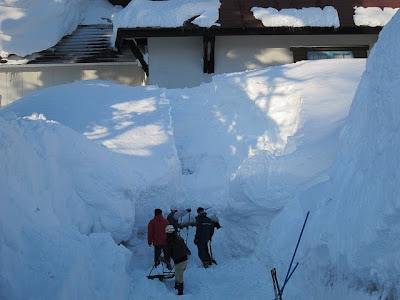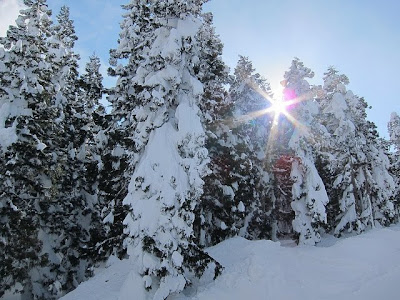
It's coming up to the end of the fiscal year here at Kyoto University, which means only one thing: it's time to burn some money!
Our graduate school traditionally gets rid of leftover money in the budget by cooking up an all-expenses-paid trip for students under the guise of "research" or "internationalization." I'm not complaining; I love these annual junkets. The trips include free transportation, free food, free hotel room, and free fun.
This year's junket was a trip to Wakayama prefecture to learn about life in a coastal community. Our itinerary included a stop at a farmer's market, an afternoon at a fishing village, a tour inside traditional wooden houses, a stay at an onsen hotel, a trip to Kyoto University's Shirahama aquarium, and a walk along the Sandanbeki cliffs.
We were supposed to visit the port to watch local fishermen unload their catch but when we arrived, the fishermen had nothing to show us because the fish weren't biting. As a consolation, they offered to take us to their man cave.


The man cave was originally a storage shed. The fisherman who owned the shed had a rocky relationship with his wife, so when they were fighting, he'd sleep in the shed. At some point, a few other unhappily married fishermen started to sleep in the shed too. The shed became a natural gathering place for the fishermen, so the owner decided to fancy it up. He put down flooring, installed a kitchen, got a cable hookup, crammed in a few sofas, bought several cases of beer, and turned it into a proper man cave. The owner invited us inside and showed us a home movie, which consisted of some very old, very drunk men singing some very off-key songs. As we were leaving, one of the fisherman gave us some grandfatherly advice on how to enjoy the evening, "Get drunk and then pass out!"
After we left the man cave, we visited some traditional wooden houses in the old part of town. This was probably my favourite part of the trip, since I love snooping inside strangers' houses.



These were not museums. These were real houses with real people living inside them. I have no idea why the local people would allow a group of about 20 foreign students to go tramping through their homes but they seemed to enjoy the attention. One of the homeowners tipped off the local newspaper and a journalist showed up to take pictures and interview one of our professors. It must have been a slow news day.
We spent the night at an onsen hotel in the resort town of Shirahama (which can only be described as the Jersey Shore of Japan). The hotel, a monstrosity built during the bubble years, smelled of stale cigarette smoke. But the food was free, the onsen was hot, the yukatas were cute, and the futons were fluffy. Free trips don't get better than that!


This sign was interesting. I was curious to know what was hidden underneath the "water for smooth, firm shining skin" sticker. Glenn suspected the original offer was for a bottle of booze, which had to be changed after the town joined the nation-wide "stop drunk driving" campaign.

In addition to "water for smooth, firm, shining skin," you can also get whale skin in Shirahama.

If the view is obscured by fog or clouds, you can pose for photos against this backdrop. Your family and friends will never know the difference!



























